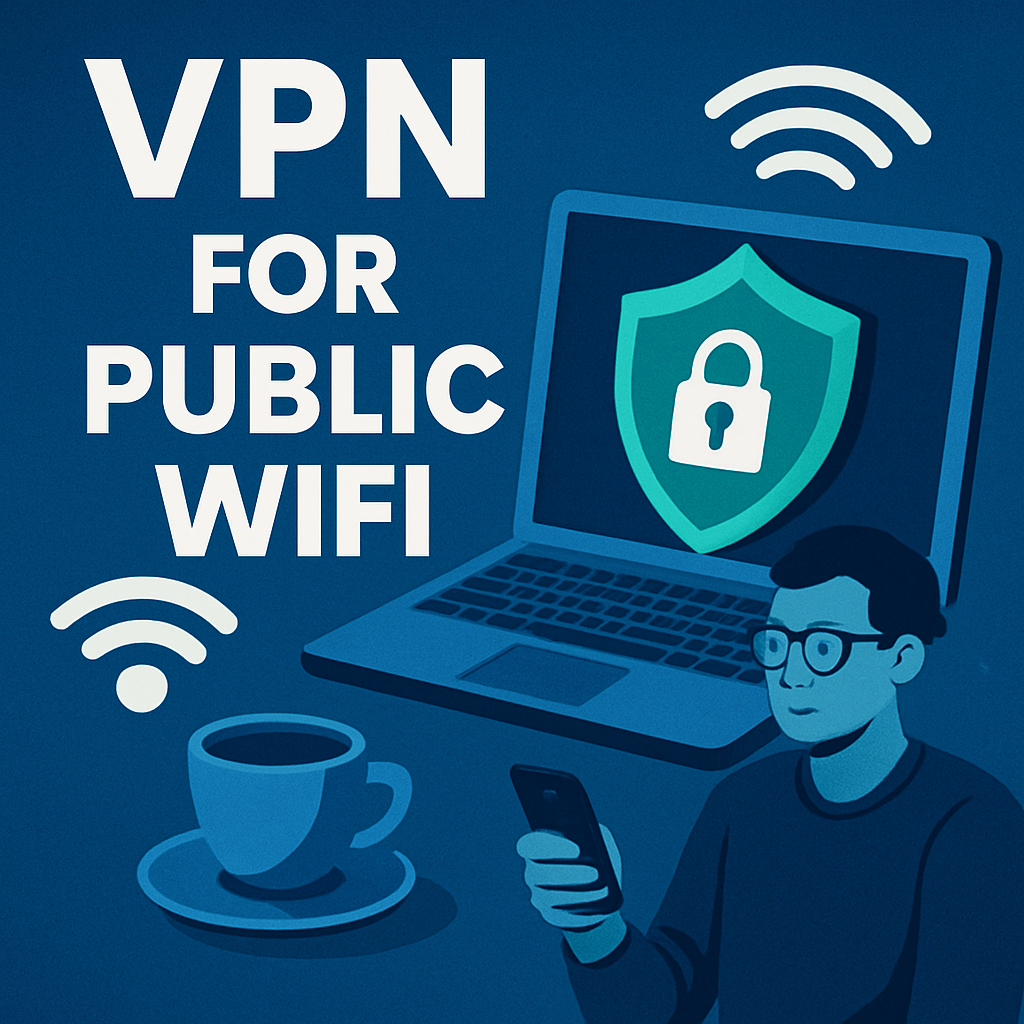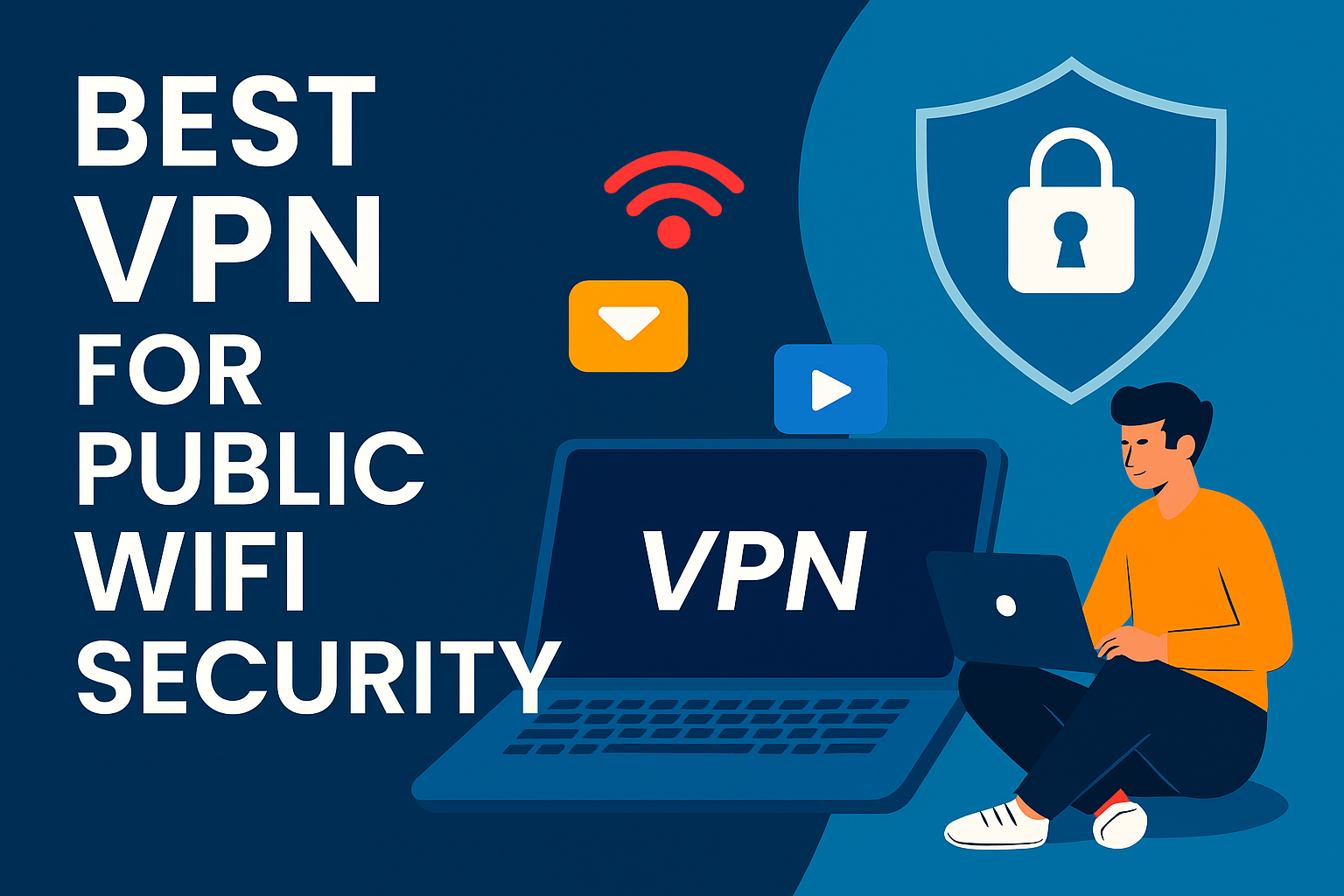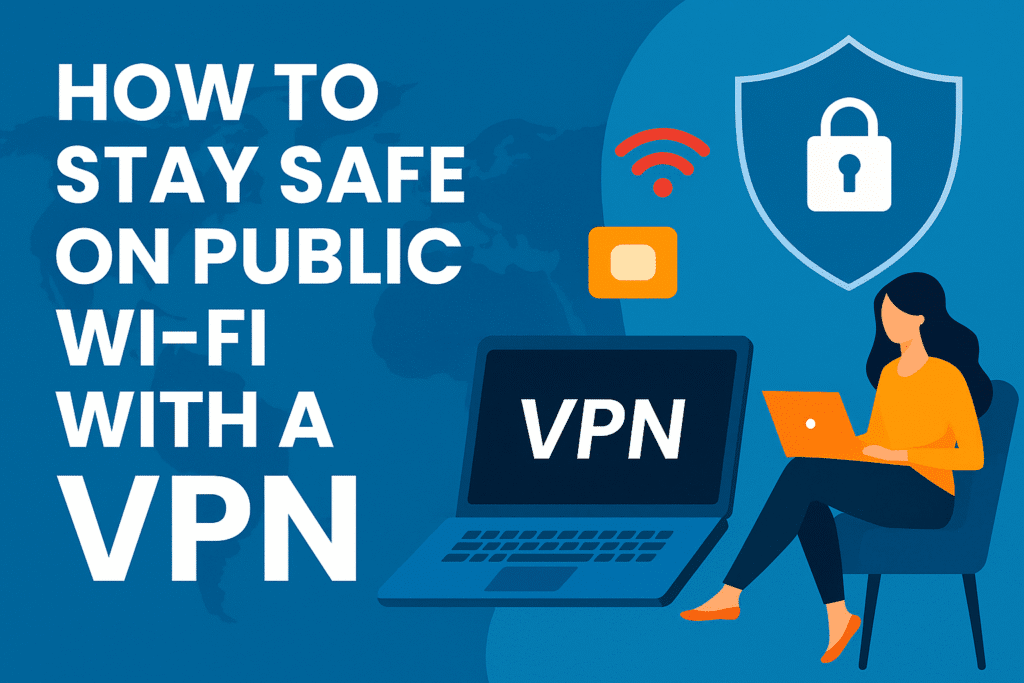Introduction

VPN for public WiFi in 2025. Public hotspots at airports, hotels, and cafés are convenient, but they expose you to hackers and tracker Public WiFi is everywhere — in airports, hotels, coffee shops, and even shopping malls. It’s convenient, but also one of the riskiest places to go online. Hackers set up fake hotspots, WiFi owners can log your browsing activity, and advertisers use open networks to track you. That’s why millions of users now ask: “Do I need a VPN for public WiFi?”
Using a VPN for public Wi-Fi in 2025 is no longer optional—it’s the easiest way to stay safe while browsing in cafes, airports, and hotels.
The answer is yes. A VPN (Virtual Private Network) is one of the simplest and most powerful tools to protect yourself on unsecured networks. In this guide, you’ll learn:
- Why public WiFi is dangerous
- What a VPN actually protects you from
- Which VPN features matter most for public WiFi
- The best VPNs for safe browsing in 2025
- Step-by-step tips to stay secure
Let’s dive in.
Table of Contents
- Why Public WiFi Is Risky in 2025
- What a VPN Does on Public WiFi
- VPN for Public WiFi: Benefits and Limitations
- Scenarios Where You Must Use a VPN (Hotels, Airports, Cafés)
- VPN vs. HTTPS: What’s the Difference?
- Free VPNs for Public WiFi: Are They Safe?
- Paid VPNs vs. Free VPNs: Which Should You Choose?
- Best VPN Features for Public WiFi Protection
- Comparison Table: Top VPNs for Public WiFi in 2025
- Extra Security Tips Beyond VPNs
- FAQs About VPN for Public WiFi
- Conclusion — Is VPN for Public WiFi Worth It?
Why Public WiFi Is Risky in 2025
Public WiFi is inherently unsafe because it’s an open network that anyone can connect to. That means your data may pass through:
When connected to open networks, hackers can intercept your traffic, but a VPN for public Wi-Fi in 2025 encrypts your data and hides your identity in real time
- Unencrypted traffic → If a site doesn’t use HTTPS, your passwords and browsing data are visible.
- Man-in-the-Middle Attacks (MITM) → Hackers intercept communication between you and websites.
- Fake Hotspots → Attackers set up WiFi networks with names like “Free Airport WiFi” to trick users.
- Tracking by WiFi owners → Hotels, cafés, or airports may log your activity and sell data.
- Session hijacking → Attackers can steal your cookies and access your accounts.
A VPN fixes most of these problems by encrypting your data and masking your identity.
What a VPN Does on Public WiFi
Best VPN for Public Wi-Fi in 2025: What You Need to Know
When you connect to a VPN for public WiFi, three things happen:
- Encryption — Your traffic is scrambled with military-grade encryption. Even if a hacker intercepts it, it’s unreadable.
- IP Masking — Instead of showing your device IP, websites only see the VPN server IP.
- Safe DNS Requests — VPNs route your DNS lookups through secure servers, preventing WiFi owners from logging what sites you visit.
👉 Without a VPN, you’re like shouting private details in a crowded café. With a VPN, it’s like whispering through a secure tunnel.
VPN for Public WiFi — Benefits and Limitations
Key Benefits of Using a VPN for Public Wi-Fi in 2025
✅ Benefits
- Protects against hackers → Even if someone is snooping on the same café WiFi, they can’t read your data.
- Shields browsing history from WiFi owners → Hotels or airports won’t see the sites you visit.
- Avoids ISP throttling → Some networks slow down streaming or gaming; VPN encryption prevents that.
- Unblocks geo-restricted sites → Want to stream Netflix or access home banking abroad? A VPN helps.
- Secure mobile apps → Messaging, email, or banking apps also go through the VPN tunnel.
❌ Limitations
- Doesn’t stop account tracking → If you log into Gmail, Google still sees your searches.
- Local malware still dangerous → A VPN won’t clean a virus already on your laptop/phone.
- Connection speed → Public WiFi is slow by nature; a VPN adds encryption overhead.
👉 Bottom line: A VPN for public WiFi is essential, but not a magic bullet. Combine it with good habits (see Section 10).
Scenarios Where You MUST Use a VPN
Why Choosing the Right VPN for Public Wi-Fi in 2025 Matters
🛫 Airports
Free airport WiFi is notorious for being unsecured. Hackers can intercept data from thousands of travelers in minutes.
🏨 Hotels
Hotels often use shared networks across hundreds of rooms. Your activity may be logged by the hotel itself.
☕ Cafés & Restaurants
Coffee shop WiFi is often open with no password, making it the easiest target for data sniffing.
📚 Libraries & Schools
Even if the network is safe, administrators can monitor browsing. A VPN restores your privacy.
👉 In all these cases, using a VPN for public WiFi makes the difference between safe browsing and leaving digital footprints.
VPN vs HTTPS — Do You Still Need Both?
Why Using a VPN for Public Wi-Fi in 2025 Is More Important Than Ever
Using a VPN for public Wi-Fi in 2025 is no longer optional; it’s essential for your privacy
- HTTPS encrypts your traffic between you and a website.
- VPN encrypts all your traffic between your device and the VPN server.
Without a VPN:
- The WiFi owner still knows which websites you visit (via DNS lookups).
With a VPN:
- Even your DNS requests are encrypted (if the VPN handles DNS properly).
👉 HTTPS is good, but a VPN for public WiFi adds a second protective layer that covers gaps HTTPS can’t.
Free VPNs for Public WiFi — Are They Safe?
This is where many users get trapped. Free VPNs are attractive, but:
- They often log and sell your data (defeats the purpose).
- Many have weak or no encryption.
- Free servers = overloaded and slow.
- Some contain malware/trackers inside the app itself.
👉 If you absolutely must use one, choose providers with strong reputations and transparent policies (ProtonVPN free tier, Windscribe free).Best VPN for Travel in 2025
But for serious protection on public WiFi, a paid VPN is safer and faster.
Paid VPNs vs Free VPNs
| Feature | Free VPNs | Paid VPNs |
|---|---|---|
| Encryption | Sometimes weak | Strong (AES-256/WireGuard) |
| Speed | Slow (overcrowded servers) | Fast, stable connections |
| Logging policy | Often logs and sells | No-logs (audited) |
| Ads | Common | Rare or none |
| Server choice | Limited | Global coverage |
👉 If you’re using a Vpn for public wifi, the small monthly fee for a trusted provider is worth the peace of mind.
Best VPN Features for Public WiFi
We tested several VPN for public Wi-Fi in 2025 services to measure real speed and protection
When choosing a VPN for public WiFi, look for:
- No-logs policy (audited, not just promised)
- Kill switch (drops internet if VPN fails)
- DNS leak protection
- AES-256 or WireGuard encryption
- Auto-connect on untrusted networks (great for travelers)
- Cross-device support (phone + laptop + tablet)
Comparison Table — Top VPNs for Public WiFi in 2025
| VPN | No-Logs (Audited?) | Kill Switch | Leak Protection | Auto WiFi Protection | Best For |
|---|---|---|---|---|---|
| ExpressVPN | Yes | Yes | Yes | Yes | Travelers & Streaming |
| NordVPN | Yes | Yes | Yes | Yes | Security + Value |
| ProtonVPN | Yes | Yes | Yes | Yes | Privacy Enthusiasts |
| Surfshark | Yes | Yes | Yes | Yes | Budget Users |
| Mullvad | Yes | Yes | Yes | Yes | Maximum Anonymity |
(You can convert this into TablePress and add affiliate buttons if needed
Extra Security Tips Beyond VPNs
- Use Incognito/Private mode to avoid local history saving.
- Turn off auto-connect WiFi on your phone.
- Use two-factor authentication (2FA) for important accounts.
- Prefer apps with end-to-end encryption (Signal, WhatsApp, ProtonMail).
- Keep your system updated; VPN won’t stop malware.
- Use a password manager instead of reusing weak passwords.
- Before choosing any provider, always test your VPN for public Wi-Fi in 2025 to ensure fast speed, reliability, and secure tunneling.
👉 streaming VPN for public wifi use
FAQs
1. Is it safe to use a VPN on public WiFi?
Yes. A VPN encrypts your data, hides your browsing history from WiFi owners, and makes it much harder for hackers to spy on you.
2. Does a VPN hide my browsing from Google on public WiFi?
No. If you’re logged into your Google account, it can still track your searches. A VPN only hides traffic from WiFi owners/ISPs.
3. Can hotels see what I’m browsing with a VPN?
No. They only see encrypted VPN traffic, not the sites you visit.
4. Are free VPNs safe on public WiFi?
Most are not. Many sell data or show ads. Safer options: ProtonVPN Free, Windscribe Free.
5. Do I need a VPN on my phone at Starbucks?
Yes. Phones are just as vulnerable as laptops on open WiFi. Use auto-connect VPN features.
Feature | Express VPN | Nord VPN | Surfshark | Proton VPN |
Overall Rating | 4.90/5 | 4.80/5 | 4.7/5 | 4.5/5 |
Best For | Best overall | Speed & security | Unlimited Devices | Privacy & Open |
Speed | Ultra Fast | Very Fast | Fast | Meduin Fast |
Streaming(Netfix) | Yes | Yes | Yes | Limited |
Device Allowed | 8 | 10 | Unlimited | 10 |
Money Back Gurantee | 30 Days | 30 Days | 30 Days | 30 Days |
Pricing | $6.67/mo | $3.29/mo | $2.49/mo | $4.49/mo |
Deal |
Conclusion — VPN for Public WiFi
So, is a Vpn for public wifi really necessary? The answer is absolutely yes. Without one, you’re leaving your passwords, browsing activity, and personal data open to hackers, WiFi providers, and trackers. In summary, investing in a trusted VPN for public Wi-Fi in 2025 guarantees you stay protected from identity theft and network snooping wherever you go.
A VPN encrypts your data, hides your browsing from prying eyes, and gives you the peace of mind to use hotel, café, and airport WiFi safely. But remember — no tool is perfect. Pair your VPN with safe browsing habits, private search engines, and security hygiene for maximum protection.
👉 Final takeaway: Using a VPN for public WiFi in 2025 is one of the easiest and most important steps you can take to protect your online privacy.


